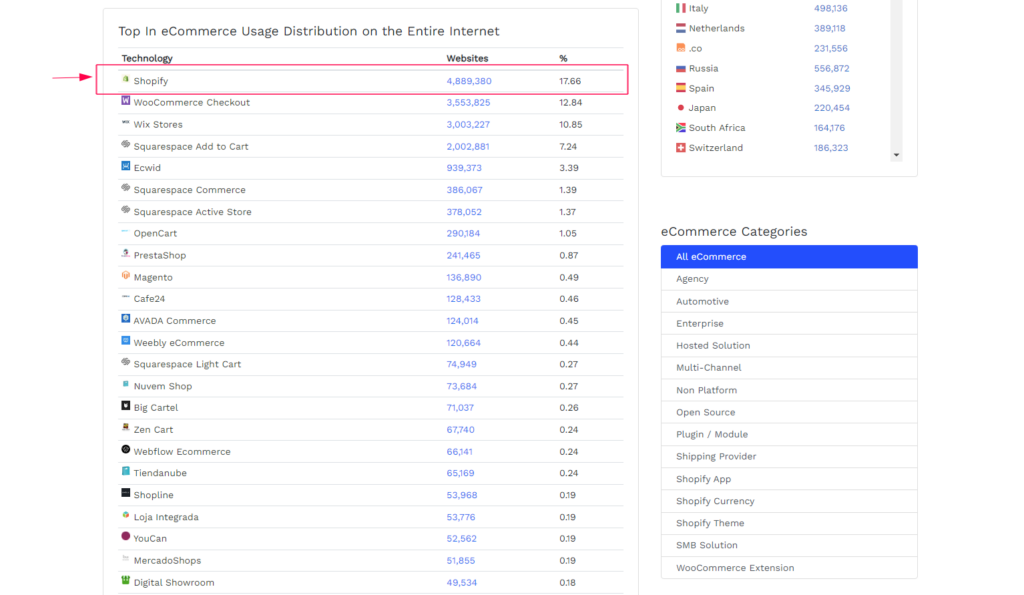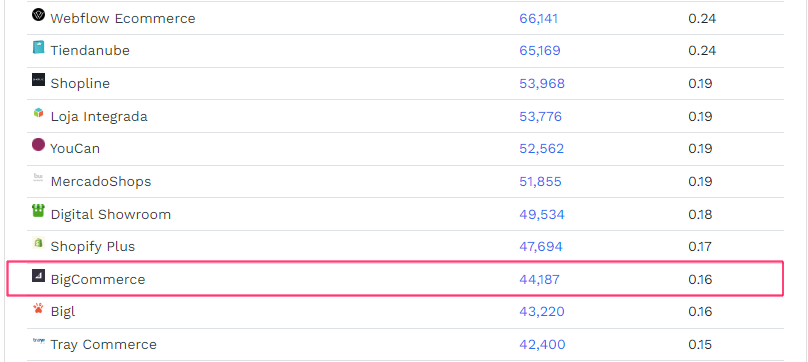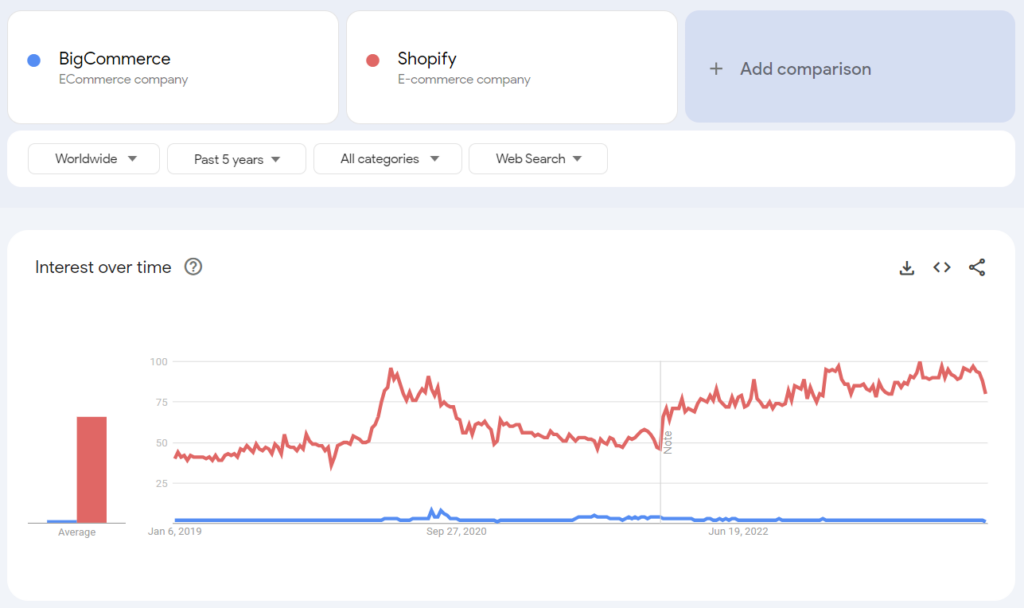Cost to Migrate a BigCommerce Store to Shopify

BigCommerce is no doubt a nice competitor of Shopify. But running your online store on BigCommerce is not all sunshine and rainbows, it includes headaches. And you agree with it.
Whether we’re talking about its annual sales limit, limited free design options, occasional lapses in customer support, or the challenges of scaling up, BigCommerce presents hurdles. To top it off, with all these downsides, BigCommerce turns out to be quite pricey as well. Therefore, your decision to migrate from BigCommerce to Shopify is undoubtedly the best.
For those still unsure about moving to Shopify, with doubts lingering, this blog has all the information you need to make a confident choice! Discover if Shopify suits your needs, learn about migration costs and time, and understand its impact on your store’s SEO. It’s your one-stop shop to clear up any doubts.
Curious about the cost of migrating to Shopify, just click the link in the table of contents. We’ll kick things off by comparing BigCommerce and Shopify to see if your decision to migrate to Shopify is worth it. Ready to dive in?
Let’s go!
BigCommerce Vs. Shopify: In-depth Comparison

This head-to-head battle between BigCommerce and Shopify will break down the key features, functionalities, pricing, user-friendliness, and other nuances of each platform. By the end of this comparison, you’ll have clarity on whether Shopify is the right platform for you to migrate to or not.
Let’s start.
1. BigCommerce Vs. Shopify – Market Share
Shopify is no doubt a more popular platform than BigCommerce.
There are over 4.8 million websites built with Shopify, which is a big 26% of all the successful websites on the internet, in 2023. Now, this makes Shopify the number one eCommerce platform as well, according to BuiltWith.

(Source: BuiltWith)
On the other hand, BigCommerce doesn’t come close to Shopify in terms of market share. It only has around 44,000 websites working across the globe.

(Source: BuiltWith)
If we try to confirm its popularity through Google Trends, it’s clear to see that more people are interested in Shopify than in BigCommerce.

Verdict: Shopify stands out as a highly influential platform and is the preferred choice of a greater number of store owners compared to BigCommerce.
2. BigCommerce Vs. Shopify: Which is Easy to Use?
Both BigCommerce and Shopify are user-friendly platforms.
However, Shopify is widely recognized as a beginner’s dream, and it’s true. Shopify was designed to help merchants quickly and easily start their eCommerce operations. Even though other platforms might prove its easy interface as a downside of Shopify, for their own sales and marketing, Shopify chose to stay loyal to its goal.
If you ask me to elaborate on the user-friendliness of its interface, here are some areas I would point out:
- Each Shopify feature has a tooltip explaining its purpose upon hover.
- Adding and updating products is a straightforward process with each piece of information accessible and well-organized.
- Shopify’s drag-and-drop functionality makes theme customization the easiest job in the world.
… And more.
On the other hand, BigCommerce, being an Open SaaS platform, comes with many features built-in. Generally, platforms with more options tend to be more complex. So, yes, BigCommerce has a complex user interface, demanding a steep learning curve to become familiar with its UI.
For example, to perform a basic task like adding a product on BigCommerce, the process is noticeably longer compared to Shopify, involving filling in numerous information fields.
Verdict: Shopify was designed from scratch to be simple and to me, it has maintained that focus over the years. This is a significant factor for you to consider in an eCommerce platform, especially since you’ll be working on it every day.
3. BigCommerce Vs. Shopify: Which one has more Features?
BigCommerce comes with a lot of features built-in, so you can create your store and make it work the way you want without needing to add extra tools. On the other hand, Shopify requires you to pick and add apps from its app store to get the features you need.
But here’s a reality to face.
- However, BigCommerce has more features built-in making it persuasive in first look, Shopify App Store has around 8000 apps to integrate functionality. And there are strong chances that someone in that marketplace has built apps for each functionality needed to help you add additional and advanced features. However, Shopify apps come with price tags but they often fall on the affordable side only.
- Shopify provides an automatic abandoned cart recovery feature with each level of its subscription plans, while BigCommerce has it with and after medium-level plans only.
- BigCommerce doesn’t have a built-in POS system. Whereas Shopify has a fully integrated POS solution and that can make your life a lot easier if you plan on selling your goods in physical stores as well.
- There are more third-party apps available for Shopify than for BigCommerce, as its market share is significantly higher and is a highly preferred eCommerce platform.
… And more.
Verdict: So, the thing is that BigCommerce gives you more right away, but it’s complex to handle. Shopify is simpler for beginners and store owners who wish some control over their store and still do not compromise on any necessary features.
4. BigCommerce Vs. Shopify: Which is More Affordable?
Both platforms, BigCommerce and Shopify, operate on subscription plans that are almost similar to each other. So, how do we figure out an affordable option? Let me help you.
Cost comes in two ways: the purchase of packages and the integration of additional features. I already mentioned that subscription packages are almost similar, so let’s check the expenses you may need to face for adding features.
At this point, a bias of BigCommerce would favor it suggesting it has more features built-in, so there won’t be any additional cost. In contrast, with Shopify, you’ll require tons of paid apps.
However, it’s important to note that BigCommerce doesn’t have all eCommerce features and functionalities built-in, and there is also a lack of third-party app availability compared to Shopify. Consequently, you’ll need to custom-build the functionalities you seek in your eCommerce store, which is way more expensive than the cost of purchasing Shopify apps.
This means Shopify’s large ecosystem of apps will make your need for features and functionality more affordable by keeping you from having to custom-develop one. Moreover, Shopify’s learning curve is small, so you won’t need to spend on experts as much as with BigCommerce.
Verdict: If you’re seeking an affordable and reliable platform, Shopify is undoubtedly an excellent choice compared to BigCommerce.
5. BigCommerce Vs. Shopify: Is There a Yearly Sales Limit?
BigCommerce has a yearly sales limit, while Shopify doesn’t impose any limits on sales.
Let me provide an overview. With BigCommerce, you may have experienced that once your yearly sales reach a certain amount specified in the package, you’ll automatically be upgraded to a higher-level plan.
Here, I’ve added a table to share an idea of the number of annual sales allowed with BigCommerce subscription packages:
| Subscription Packages | Package Pricing | Amount of Annual Sales Allowed |
| Standard | $39 per month | Up to $50,000 |
| Plus | $105 per month | Up to $180,000 |
| Pro | $399 per month | Around $400,000 |
This automatic plan upgrade comes with access to advanced features like customer groups, abandoned cart recovery, and more. But yes, you’ll need to pay a higher price for it. Whereas, Shopify never pushes you to buy a bigger subscription plan when your sales number grows.
You have unlimited sale allowance, features like abandoned cart recovery, POS system, customer segmentation, and other marketing features, regardless of your plan level. And yes, Shopify also has even more advanced features on its higher-tier plans. But Shopify believes in providing freedom of choice, on whether to move to a fancy plan or not. It’s all up to you!
You can take your time and figure out if you need to avail of its advanced features or you can keep up without them, and without the force of upgrading to a higher tier plan.
Verdict: BigCommerce limits your yearly sales, but Shopify lets you sell as much as you want, without any pressure to upgrade to an expensive plan, providing flexible scalability.
Quick Comparison
We compared the main factors, and Shopify won in each category. And the picture doesn’t end there. To make you aware of how additional features are fulfilled by both BigCommerce and Shopify, you can check out this handy table comparing BigCommerce and Shopify.
Let’s get started!
| Key Features | BigCommerce | Shopify |
| Mobile Responsive Themes | Yes | Yes |
| Total Apps in App Store | Approximately 1,000 | More than 8,000 |
| Sales Reporting | Yes, but limited | Yes |
| International Payment Methods | Yes | Yes |
| Blog CMS Capabilities | Yes | Yes |
| Drag-and-drop Store Builder | Yes | Yes |
| Fraud Analysis | Yes | Yes |
| Custom Online Store | Yes | Yes |
| Hosting Inclusion | Yes | Yes |
| Custom Domain Name Options | Yes | Yes |
| Multimedia Support on Product Pages | Image, GIF, video | Image, GIF, video, 3d models, augmented reality |
| Built-in POS | No | Yes |
| Business Loans | No | Yes |
| Email Campaign Management | Requires third-party apps | Yes |
| Multiple Payment Gateways | Around 65 | More than 100 |
| Fully-featured Mobile App | Yes, but without access to editor | Yes |
| Number of Products Allowed | Unlimited | Unlimited |
| Annual Sales | Limited | Unlimited |
| International Customer Support | No | Yes, in 21 languages |
| Discount on Packages | 25% off on yearly plans | 25% off on yearly plans |
(Source: Shopify)
That wraps up our comparison between BigCommerce and Shopify.
I hope this comparison has helped clear any doubts you may have had about whether Shopify is the right platform for you – which it certainly is. Now, let’s move on to address additional questions you may have before deciding to migrate from BigCommerce to Shopify.
We’ll start by discussing the amount of time you might need to spend on the migration process.
Time to Migrate a BigCommerce Store to Shopify

In simple terms, the larger your online store, the switch from BigCommerce to Shopify will take longer.
This is because the time to shift your BigCommerce store data to Shopify will depend on the size of your product list, store features, customer details, order information, and more. So, yes, there is no universally fixed time to present here.
But to provide clarity, here’s an approximate timeline for migrating your BigCommerce store to Shopify:
If your BigCommerce store is small to medium-sized, with not much data or many functionalities, switching to Shopify could take about 7 to 10 days. However, if your online store has an extensive amount of data and functionality, Shopify migration might take a longer time—around 2 to 4 weeks.
Moreover, our BigCommerce to Shopify Migration services offer a complete migration to Shopify within 14 days*.
So, now, I hope you have an idea of how much time you’ll need to spend on migration. Now, let’s talk about what everyone’s been waiting for—the amount of money you need to spend on migration.
Cost to Migrate BigCommerce Store to Shopify

Just like above, here also, we have no specific amount of migration cost to present, as the cost of migration comes in chunks. Those chunks include; the cost of purchasing a Shopify subscription plan, data migration cost, and cost that comes while redesigning your new Shopify store.
Let’s have an in-depth breakdown of each associated cost.
1. Shopify Subscription Fees
Just like when choosing to move into a new house, you sell your current one and buy another. Similarly, when transitioning from BigCommerce to Shopify, you’ll first need to purchase a subscription plan to own your Shopify store.
This marks the initial cost you encounter when you opt to migrate to Shopify. Here, you can select the right plan for operating your new Shopify store.
| Shopify Plan | Pricing | Suited For |
| Basic Shopify Plan | $39 per month | Individuals and Small Businesses |
| Shopify Plan | $105 per month | Small to Medium-sized Businesses |
| Advanced Shopify Plan | $399 per month | Medium to Large-sized Businesses |
| Shopify Plus | Starting from $2000 per month | Enterprise-sized Businesses |
Shopify’s plan pricing is almost similar to BigCommerce’s package pricing, but the plan offerings are certainly better. So, explore pricing plans thoroughly and choose the one that fits your business size and requirements.
Until then, let’s move on to understanding another associated cost.
2. Data Migration Cost
At this point, you’ll own your store, and it’s time to bring in data (i.e., product data, order data, and customer data) from your source store to your new Shopify store. And yes, that’s another cost associated when migrating from BigCommerce.
Let’s explore how the import and export of store data will impact your budget.
Firstly, you’ll need to hire a Shopify developer because data migration involves various moving parts and requires expertise; otherwise, it may adversely affect your store’s SEO, data security, and may also result in data loss.
Secondly, if you choose for DIY migration you’ll need to pay for data migration tool fees. This option is only possible and suggested when your store is small to medium sized, and the quantity of data is minimal.
Let’s check the cost breakdown for both of them.
Costs Associated with Hiring a Shopify Expert for Migration:
- Fixed Rate: Starting from $10,000
- Hourly Basis: Starting from $25/Hour
Average Cost of Data Migration Tool:
The cost of a data migration tool ranges from a few hundred dollars to several thousand dollars, depending on the chosen tool and the amount of data that needs to be migrated. Some Shopify migration tools that I suggest are Cart2Cart, LitExtension, and Matrixify. You can find them right on the Shopify App Store.
All of these tools provide a free demo migration, allowing you to test them before making purchases.
Moreover, if your store size is too small, and you don’t have much store data, you can migrate your store data through CSV files. And it won’t incur any expense. It will only require your efforts to create a CSV file for each set of data you wish to migrate and export it to your new Shopify store.
Now, let’s explore whether there are additional costs you may encounter during the transition from BigCommerce to Shopify.
3. Shopify Store Set Up and Redesign Cost
As you move forward with your migration process, you now have a new Shopify store where all your store data has been transferred.
However, your Shopify store might currently look basic and dull, lacking the theme and functionality. So, here comes another cost post-migration: the expense of setting up and redesigning your Shopify store. The expenses will include theme costs, app fees (for functionalities), and hiring Shopify experts.
Let’s check the cost breakdown for them.
Average Pricing for Shopify Themes:
Shopify provides free themes, and premium options are also available, typically priced between $180 and $350.
Average Pricing for Shopify Apps:
The Shopify app store offers a selection of over 8000 apps, both free and premium. Premium apps on the Shopify platform generally cost around $20 per month on average.
Cost for Setting Up or Redesigning Your Shopify Website:
Chances are, you’ll require expert help while redesigning your store, especially when you seek high-quality customization and seamless integration of Shopify themes and apps. For that, the cost of hiring will fall between $500 and $5,000, depending on the extent of customization required and the expertise of the developer you hire.
And that’s all.
This covers every expense you may encounter when migrating from BigCommerce to Shopify. Until now, we’ve discussed each major concern you might have had so far, except one – the SEO of the store.
So, will your SERP rankings remain the same even after you migrate your store from BigCommerce to Shopify? Let’s find out.
Does BigCommerce to Shopify Migration Impact Store SEO?
Yes, migrating from BigCommerce to Shopify involves the risk of losing your SERP rankings. However, you can mitigate this risk by following the correct SEO transfer process. In this section, we’ll check how you save your store SEO after migration.
But first, let’s check how SEO is affected during migration.
Shopify and BigCommerce have different URL structures. So, when you migrate, your Shopify store URL structure will be different from the old one that used to show up on search engines. And the URL is information that search engines use to assign SERP positions.
Now, after migration, that older URL will give a 404 error. This can increase your bounce rate, and over time, your website might lose its top positions.
However, it’s not a big thing to worry about; you can solve it easily. Here’s your Shopify migration checklist for proper SEO migration.
- If possible, keep URL structures the same.
- If you’re changing URL structures, make sure to use 301 redirects. It will inform search engines that your URL structure has changed and will redirect your visitors to the newer web page rather than presenting them with 404 errors.
- Ensure proper canonicalization to guide search engines in identifying the preferred version of your pages and minimizing the risk of duplicate content issues.
- Migrate each of your product descriptions, blog posts, and other content.
- Don’t leave behind your metadata, including meta tags, titles, and meta descriptions for each page.
- Make sure that no header tags (H1, H2, and more) are changed during Shopify migration.
- Ensure ALT tags for images are migrated as well.
- Look for any broken links and fix them.
- Once Shopify migration is completed, resubmit your sitemap to Google Search Console.
- Generate a comprehensive backlink report of your BigCommerce store with tools like Moz and Ahrefs. Later, contact those websites and ask them to update your new links.
That’s all.
Taking care of these areas won’t upset your expectations to stand strong on SERP. And if you still see any drop in ranking, I suggest not to worry, as it’s normal to experience a temporary ranking drop during or after migration.
If you’ve followed the Shopify migration process in the right direction, you’ll regain your previous SERP positions.
A thing to note: Shopify is way better in terms of performance and user experience, so there may be a chance that your ranking positions may improve compared to what you once had with your BigCommerce.
Lastly, whether you have any other questions about moving to Shopify, need help with accurate information on time, cost, and SEO, or want to perform migration, it’s important to have an expert by your side.
This is because Shopify migration involves various risk factors such as losing important store data, security, and more, and only experts can guide you smoothly through the process.
If you want me to suggest a reliable Shopify migration company, the next section is all you need to read.
Aureate Labs is the Best for Seamless BigCommerce to Shopify Migration!
We, Aureate Labs, are a proud Asia-based eCommerce development agency providing an extensive range of Shopify Services to our customers around the globe. Our expert Shopify developers are masters in migrating your BigCommerce store to Shopify, understanding the challenges involved in the migration process, and providing effective solutions.
What sets our Shopify migration service apart is our competitive pricing and our commitment to delivering high-quality work. Furthermore, we ensure a seamless transition to Shopify within just 2 weeks, with complete preservation of all your data, SEO, and overall online presence.
Gain more information on our Shopify Migration Services here, and feel free to contact our Shopify experts and get started.
Final Words
Just as I mentioned at the start of the blog, BigCommerce is a nice competitor to Shopify, and both platforms have subtle and nuanced differences. However, Shopify is undoubtedly a great platform that offers each solution with ease. It is certainly worth the hype of migrating to it.
Lastly, I hope the information provided in this blog was clear enough to address all your doubts. If you have any lingering questions in your mind, feel free to write them in the comments below.






Post a Comment
Got a question? Have a feedback? Please feel free to leave your ideas, opinions, and questions in the comments section of our post! ❤️